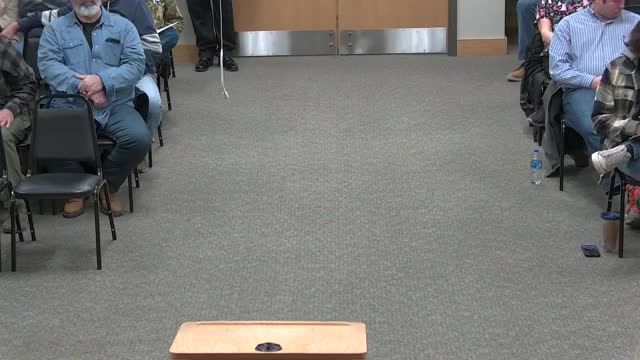Scott County approves 4 MW community solar project on Rycove Memorial Road
Get AI-powered insights, summaries, and transcripts
Subscribe
Summary
The Scott County Board of Supervisors approved a special-use permit for a 4-megawatt community solar facility on William Johnson’s farm off Rycove Memorial Road after a public hearing that included technical presentations by developer New Leaf Energy and concerns from nearby residents.
The Scott County Board of Supervisors on an agenda day in January approved a special-use permit for a 4-megawatt community solar project on parcel 50-A-12, proposed by New Leaf Energy for the William Johnson property off Rycove Memorial Road.
New Leaf Energy project developer Jesse Robinson told the board the installation would fall under Virginia’s shared- or community-solar program. "Community solar ... those projects are 5 megawatts or less," Robinson said, describing the project as a distribution-tied, fixed-tilt array that would allow subscribers to receive credits on their utility bills.
The board’s approval follows a multi-part presentation and public hearing in which the company described technical, environmental and decommissioning safeguards and neighbors raised concerns about noise, water quality and habitat change. Robinson said the company has performed environmental reviews including a Phase I environmental site assessment, wetlands/stream delineations and consultations with state wildlife and historic-resources reviewers, and that the facility would not cross wetlands and would be sited to minimize visibility.
Project details presented to the board and included in the permit record: the facility would occupy roughly 35 acres fenced for panels, with an additional about 9 acres designated for stormwater basins and access; it would be a fixed-tilt array without batteries; interconnection would be to Appalachian Power’s distribution system pending its study and any required upgrades; construction was estimated at 6–8 months; the lease term presented to the county is 20 years with 5-year renewal options up to 40 years; and the developer described a decommissioning bond and engineer estimate to guarantee removal and site restoration at the end of operations.
Neighbors spoke at the public hearing. Terry Fields, who said he owns land adjoining the proposed site, questioned siting near springs and geological fissures and warned of potential water impacts from damaged panels and runoff. "This should be strengthened," Fields told the board, citing sinkholes and springs on nearby terrain. Dr. Donald Thurston, another local resident and property owner, urged caution about ecological changes, saying, "Anytime you change a habitat, you change everything."
New Leaf proposed three conditions for the permit that were included in the board’s approval: (1) an offer to prioritize subscriptions to Scott County residents before soliciting subscribers elsewhere; (2) a voluntary payment of $40,000 to the Duffield Fire & Rescue Department to support staffing/insurance needs; and (3) baseline testing of a spring used for potable water before construction, annual tests for five years after construction, and thereafter testing every five years (the board discussed and some supervisors recommended more frequent testing in the first years). Robinson said the company would agree to more frequent early tests if the board requested them and that the bond would cover cleanup if tests ever showed contamination.
The board’s motion to approve the special-use permit included findings that the application complies with the county solar ordinance (setbacks, noise, height, farmland limits and visual buffers) and waived an additional planning commission review step; the motion incorporated the applicant’s proffered conditions. The board approved the permit by roll-call vote with all members recorded as voting yes: Daryl Jeter (yes), Michelle Glover (yes), Eddie Skeen (yes), Michael Bricky (yes), Danny Castile (yes), Chris Manus (yes) and Stephanie Addington (yes).
Next steps noted in the hearing: the developer must complete the Appalachian Power interconnection study and obtain required state permits (stormwater/land disturbance through DEQ and any required building permits). The developer said any damaged panels would be replaced and disposed of at the company’s cost and that decommissioning would be guaranteed by a county-held bond put in place prior to construction.
The permit carries several technical and community conditions and the unanimous board vote ends the local land-use approval stage; final construction remains contingent on utility interconnection, state permits and the applicant meeting the conditions the board recorded.
